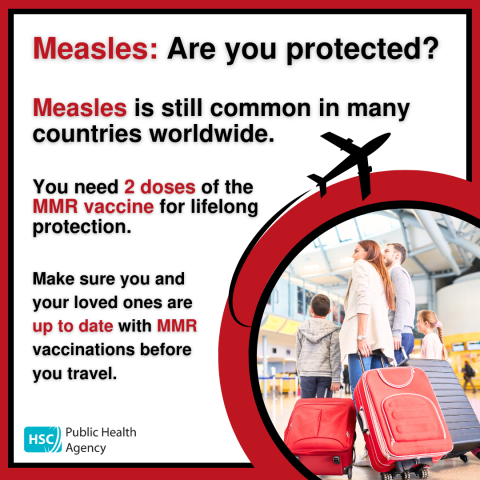Before jetting off for summer get your MMR vaccine!

The Public Health Agency (PHA) is urgently advising parents planning summer getaways to ensure their children are vaccinated as measles cases have seen a dramatic rise in recent months, affecting 17 popular holiday destinations across Europe according to the European Centre for Disease Prevention and Control (ECDC).
Louise Flanagan, Consultant in Public Health at the PHA, said: “The best way to protect yourself and your loved ones is by getting the MMR (measles, mumps and rubella) vaccine. You should plan to be fully vaccinated against measles at least two weeks before you depart. If your trip is less than two weeks away and you're not protected, you should still get a dose of MMR.
“Travelling abroad may increase your risk of catching measles, mumps or rubella and becoming ill during or after travel. There is also the risk you may spread the disease to people who are vulnerable to severe illness such as babies, young children, pregnant women or people with conditions that affect their immune system.
“Getting both doses of the MMR vaccine greatly reduces the risk of catching and spreading measles.”
Children between 12 months and 5 years of age can get the vaccine through their GP practice and those aged 6 years to 25 years of age can attend an HSC Trust vaccination clinic. Information on trust clinics can be found at www.nidirect.gov.uk/mmr-catch-up
Measles is an acute infection caused by a virus that spreads very easily. It used to be very common in children, but following the introduction of the MMR vaccine, cases fell. Recently we have seen a decrease in the numbers of children receiving the vaccine. It is therefore important vaccination coverage is improved as soon as possible to help prevent the spread of avoidable, serious and sometimes deadly diseases such as measles.
Louise Flanagan continued: “If you are unsure if you or your child is up-to-date with vaccinations, the easiest way to check is to look at your child’s red book or speak to your GP practice. If you or your child has missed any vaccination, please book an appointment as soon as you can to get the best protection. The MMR vaccine is very safe and the most effective way to prevent measles, mumps and rubella infections.
“Being unvaccinated leaves children exposed to the threat of measles, mumps and rubella, and all three of these diseases can have very serious complications.”
Although most common in children, measles can occur at any age. It is highly infectious and is caught either through direct contact with an infected person, or through the air when they cough or sneeze. It is important that anyone with suspected measles avoids any situation where they can spread the disease, such as a GP’s waiting room or an emergency department waiting room. People should phone in advance rather than turning up to these venues.
For further information see www.nidirect.gov.uk/mmr
- The European Centre for Disease Prevention and Control (ECDC) Communicable Disease Threats Report (CDTR) is a weekly bulletin for epidemiologists and health professionals on active public health threats. This issue of the ECDC Communicable Disease Threats Report (CDTR) covers the period 8-14 June 2024 and includes updates on avian influenza, cholera, West Nile virus infections, measles and mass gatherings and can be found here - www.ecdc.europa.eu/en/publications-data/communicable-disease-threats-report-8-14-june-2024-week-24
- In Northern Ireland confirmed measles cases are notified to the Public Health Agency and recorded at www.pha.site/MeaslesData. The report is updated every Thursday.
The initial symptoms of measles can include:
- a high temperature (fever);
- a runny or blocked nose;
- sneezing;
- a cough;
- sore, red eyes that may be sensitive to light;
a few days later, a red-brown blotchy rash will appear. This may start on the head or upper neck, before spreading outwards to the rest of the body.
Most childhood rashes are not measles but you should consult your GP without delay if:
- you suspect it is measles;
- symptoms worsen;
- temperature increases to above 38°C;
temperature stays high after other symptoms have gone.
